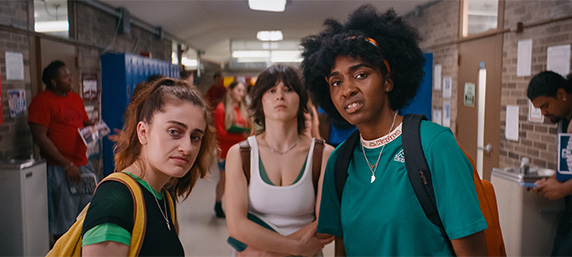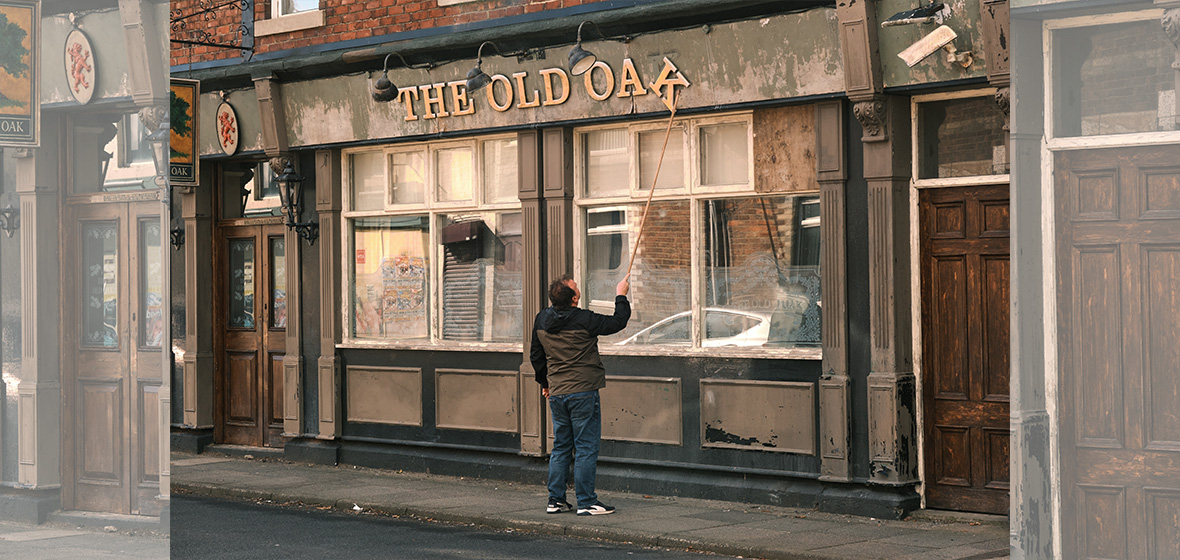The Old Oak
The Old Oak will likely be Ken Loach’s last film, and that’s as sad as it is concerning. At the age of 87, Loach has achieved more than most filmmakers, including two Palm D’Ors (The Wind the Shakes the Barley in 2006, and I, Daniel Blake in 2016) and one of the unquestioned British masterpieces – Kes – the kind of film it defines not just a generation but a whole culture. Without Kes, the landscape of British cinema would be vastly different and poorer.
And yet, what defines Loach is the activism in his filmography. Openly socialist, his work challenges Britain’s post-feudal capitalist and colonialist ideals. He galvanises the working class with care and nuance and doesn’t hesitate to force his audience to question the system we take for granted. In his previous film, the gorgeous Sorry We Missed You, he ends his critique of the gig economy with a punch in the face so strong it took my breath away and left me with a sense of panic and dread. At the time, it was an 82-year-old Loach conceding the system is unfair and perpetual.
The good news is The Old Oak is more optimistic, but only like a stoic old man resigned to a world he can’t change, leaving us a piece of wisdom for us to continue his job. In one of the first scenes, pub owner TJ Ballantyne (Dave Turner) uses a pole to straighten the “K” letter from the sign outside dangling. He struggles but gets the job done; happy, he goes back inside by slamming the front door and drops the letter again. That’s Loach for you, still trying to straighten the world even if the world stubbornly stays crooked.
The story is simple. In a working little village off Newcastle, a group of Syrian refugees arrives in the sight of a displeased population. In the pub, locals argue about their economic woes, but their targets quickly move to the freshly arrived immigrants, as if kicking them out could bring a peace they haven’t seen – something that TJ points out, “things were bad before the Syrians arrived”.
Despite his comment, Ballantyne keeps a low profile. He has a clientele to look after. Sure, they are ignorant racists, but good people overall. But he also gives a hand, helping local charity organiser Laura (Claire Rodgerson) with the delivery and a young Syrian girl, Yara (Ebla Mari), to fix her camera.
Ballantyne’s inaction is the heart of the film. Laura calls him out, and Yara reminds him of the past, when his mother opened the pub’s backroom to feed the poorest in the village during the mining strike, pointing at a plaque that says, “When you eat together, you stick together”.
With the help of his trusted writer collaborator, Paul Laverty, Loach deals with the subject with a soft and kind hand. There is no sense of superiority; even the patrons who spout racist tropes do so as a scapegoat for their own dire situation. There is a sense of hope through it, an inherent optimism that together, as a society, we can find the common ground that helps us march together for the good of us all. That’s the final message of this little gem of a film: after an emotional climax resolved with the candour of a wise man, Loach lets his characters march hand in hand towards a brighter end.
If this is Loach’s final film, it’s a fitting goodbye, but one that will leave a big hole. Loach is not just an auteur presence; his absence is more than losing an important voice – it feels like the end of the conversation.
Verdict: 4 out of 5
A tender and wise tale from one of the most important political voices in British cinema.
Bottoms

Everything about Bottoms seemed like it was right up my alley. A Gen-Z female high-school spoof like Fight Club meets Superbad with a “balls to the wall” angle to tackle heteronormative/patriarchal culture.
But if there was a time when I felt the generational divide, this was it. Written by Emma Seligman, who also co-wrote the film with actress Rachel Sennott, Bottoms feels like the work of a mid-20s mid-class filmmaker, and while there’s nothing wrong with that, it felt sometimes the film was speaking a different language, and there were no subtitles to save me.
Down to its basics, the story is straightforward. Best friends PJ (Sennott) and Josie (Ayo Edebiri) try to impress their love interests by organising a school-supported self-defence class that’s actually a front for a ladies-only fight club. In a school that flocks to idolise their local football team, they are portrayed like a pack of mindless animals who get the perks of a world where men, especially the sporty, are put on a pedestal. The problem is Josie’s interest; Isabel (Havana Rose Liu) is the girlfriend of the school’s star quarterback, and, more importantly, the girls get their street cred from a little white lie that spiralled out of control – that they went to juvenile detention and have killed someone with their bare hands.
Both Seligman and Sennott are having a ball. They populate the film with blink-and-you-miss-it background jokes that are genuinely funny and purposely unsubtle jokes that would fit in a good SNL gag. The problem is all of this effort is diluted by a rushed plot that looks more like an afterthought than anything. Gags are great and whisper power in a comedy, but if there’s a story, that needs to be the centre, not the vehicle.
The result is the film falls into several traps where characters behave unreasonably just because the filmmakers need the plot to advance in a certain way so a specific gag can work later on. Don’t get me wrong, those gags work in spades but lose some of their intensity in the whole context. Partially, this is because Seligman decides not to focus on a particular style. In a moment, she shoots a scene like a heartfelt teen-comedy; in another, she channels her best slapstick self with no segue.
Is it wrong? It’s a stylistic choice, so I’m not going to fault it for what it is but because it didn’t connect with me. In a vacuum, some of those scenes work incredibly well. Especially the bloody and brutal battle. It’s funny, but skit-comedy funny can be exhausting if it extends for 90 minutes.
Verdict: 2 out of 5
Politics in the right place and funny ideas alone don’t make a good film.




